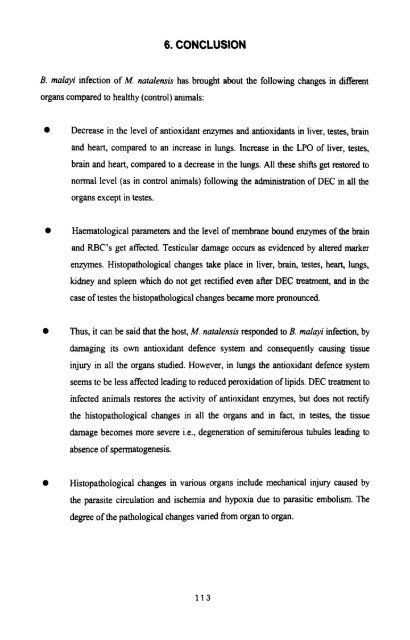effect of infection of the filarial parasite brugia malayi - Pondicherry ...
effect of infection of the filarial parasite brugia malayi - Pondicherry ...
effect of infection of the filarial parasite brugia malayi - Pondicherry ...
Create successful ePaper yourself
Turn your PDF publications into a flip-book with our unique Google optimized e-Paper software.
6. CONCLUSION<br />
B. <strong>malayi</strong> <strong>infection</strong> <strong>of</strong> M. natalensis has brought about <strong>the</strong> following changes in different<br />
organs compared to healthy (control) animals:<br />
Decrease in <strong>the</strong> level <strong>of</strong> antioxidant enzymes and antioxidants in liver, testes, brain<br />
and heart, compared to an increase in lungs. Increase in <strong>the</strong> LPO <strong>of</strong> liver, testes,<br />
brain and heart, compared to a decrease in <strong>the</strong> lungs. All <strong>the</strong>se shifts get restored to<br />
normal level (as in control animals) following <strong>the</strong> administration <strong>of</strong> DEC in all <strong>the</strong><br />
organs except in testes.<br />
Haematological parameters and <strong>the</strong> level <strong>of</strong> membrane bound enzymes <strong>of</strong> <strong>the</strong> brain<br />
and RBC's get affected. Testicular damage occurs as evidenced by altered marker<br />
enzymes. Histopathological changes take place in liver, brain, testes, heart, lungs,<br />
kidney and spleen which do not get rectified even after DEC treatment, and in <strong>the</strong><br />
case <strong>of</strong> testes <strong>the</strong> histopathological changes became more pronounced.<br />
Thus, it can be said that <strong>the</strong> host, M. natalensis responded to B. <strong>malayi</strong> <strong>infection</strong>, by<br />
damaging its own antioxidant defence system and consequently causing tissue<br />
injury in all <strong>the</strong> organs studied. However, in lungs <strong>the</strong> antioxidant defence system<br />
seems tc be less affected leading to reduced peroxidation <strong>of</strong> lipids. DEC treatment to<br />
infected animals restores <strong>the</strong> activity <strong>of</strong> antioxidant enzymes, but does not rectify<br />
<strong>the</strong> histopathological changes in all <strong>the</strong> organs and in fact, in testes, <strong>the</strong> tissue<br />
damage becomes more severe i.e., degeneration <strong>of</strong> seminiferous tubules leading to<br />
absence <strong>of</strong> spermatogenesis.<br />
Histopathological changes in various organs include mechanical injury caused by<br />
<strong>the</strong> <strong>parasite</strong> circulation and ischemia and hypoxia due to parasitic embolism. The<br />
degree <strong>of</strong> <strong>the</strong> pathological changes varied from organ to organ.

















